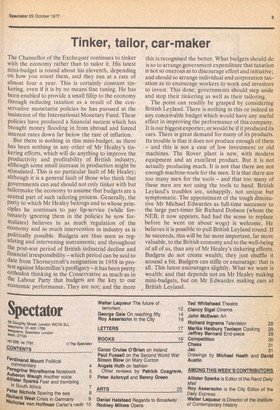Tinker, tailor, car-maker
The Chancellor of the Exchequer continues to tinker with the economy rather than to tailor it. His latest mini-budget is round about his eleventh, depending on how you count them, and they run at a rate of almost four a year. This is certainly constant tinkering, even if it is by no means fine tuning. He has been enabled to provide a small fillip to the economy through reducing taxation as a result of the conservative monetarist policies he has pursued at the insistence of the International Monetary Fund. These policies have produced a financial success which has brought money flooding in from abroad and forced interest rates down far below the rate of inflation.
But there is nothing in this mini-budget, as there has been nothing in any other of Mr Healey's tinkering efforts, which will do anything to improve the Productivity and profitability of British industry, although some small increase in production might be stimulated. This is no particular fault of Mr Healey; although it is a general fault of those who think that governments can and should not only tinker with but tailormake the economy to assume that budgets are a central part of such tailoring process. Generally, the Party to which Mr Healey belongs and to whose principles he continues to pay lip-service (while fortunately ignoring them in the policies he now formulates) believes in as much regulation of the economy and as much intervention in industry as is Politically possible. Budgets are thus seen as regulating and intervening instruments; and throughout the post-war period of British industrial decline and financial irresponsibility — which period can be said to date from Thorneycroft's resignation in 1958 in protest against Macmillan's profligacy — it has been pretty Orthodox thinking in the Conservative as much as in the Labour Party that budgets are the key to our economic performance. They are not; and the more
this is recognised the better. What budgets should do is so to arrange government expenditure that taxation is not so onerous as to discourage effort and initiative; and should so arrange individual and corporation taxation as to encourage workers to work and investors to invest. This done, governments should step aside and stop their tinkering as well as their tailoring.
The point, can readily be grasped by .considering British Leyland. There is nothing in this or indeed in any conceivable budget which would have any useful effect in improving the performance of this company. It is our biggest exporter; or would be if it produced its cars. There is great demand for many of its products. Its trouble is that it does not produce enough of them — and this is not a case of low investment or old machines. The Rover plant is new, with modern equipment and an excellent product. But it is not actually producing much. It is not that there are not enough machine-tools for the men. It is that there are too many men for the tools — and that too many of these men are not using the tools to hand. British Leyland's troubles are, unhappily, not unique but symptomatic. The appointment of the tough diminutive Mr Michael Edwardes as full-time successor to the large part-timer Sir Richard Dobson (whom the NEB, it now appears, had had the sense to replace before he went on about wogs) is welcome. He believes it is possible to pull British Leyland round. If he succeeds, this will be far more important, far more valuable, to the British economy and to the well-being of all of us, than any of Mr Healey's tinkering efforts. Budgets do not create wealth; they just shuffle it
around a bit. Budgets can stifle or encourage: that is all. This latest encourages slightly. What we want is wealth: and that depends not on Mr Healey making mini-budgets, but on Mr Edwardes making cars at British Leyland.


































 Previous page
Previous page